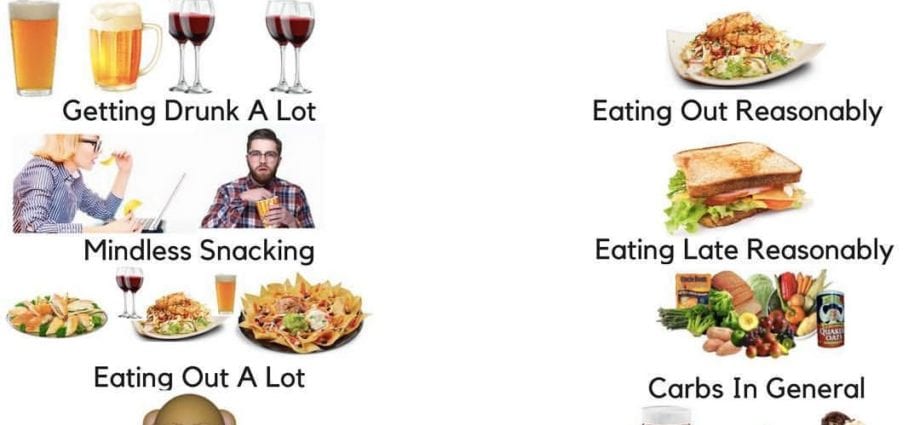Stop extra pounds!
Until about 25 years of age, excess weight, as a rule, is not so often, because the body is growing. With age, decreased insulin sensitivity worsens, and metabolism slows down even more. The body reduces the consumption of calories for heating the body and life. And those calories that were recently spent on “energy maintenance” are imperceptibly superfluous. We continue to eat as much as we used to, even though we now need less energy.
Pregnancy becomes a separate factor in the appearance of excess weight: during this period, the influence of the female hormone estrogen increases in the body, which in turn activates the process of fat formation. Which is very, very correct from the point of view of nature: after all, a woman must not only survive, but also bear a child.
The longer a person lives with excess weight, the harder it is for him to cope with this problem. The more difficult it is to “swing” the fat cell so that it will give away the accumulated. The more weight, the more difficult it is for each lost kilogram.
With age, it is necessary to reduce the calorie content of daily nutrition even more. Despite the fact that allowing oneself to exercise is becoming more and more problematic: the vessels, heart and joints affected by obesity cannot withstand serious physical exertion.
And it is much easier to maintain the state of the norm than to plunge the body into severe stress every three or four years, dropping 20 kilograms per quarter with the help of “miracle hospitals”.
There is also a genetic factor. If one of the parents is overweight, the chance of a child facing the same problem at the same age is 40%. If both parents are obese, the chances rise to 80%. And besides, there is a high probability that his figure will begin to blur at an earlier age than theirs. For example, if both dad and mom are obese before the age of thirty, most likely their children will begin to live with excess weight even before they enter adolescence.
Therefore, with dysfunctional heredity, your relationship with food must be built especially carefully and carefully. To begin with – at least be guided by the following basic principles.
The folk wisdom stuck in our teeth “You have to get up a little bit hungry from the table” is absolutely justified from the point of view of physiology – just like the call we have known since Soviet times not to eat on the go and chew food thoroughly.
In the hypothalamus (part of the brain) there are two centers that regulate appetite: the center of satiety and the center of hunger. The saturation center does not immediately respond to food intake – at least not instantly. If a person eats very quickly, on the run, without really chewing, if in this style he eats high-calorie food of a small volume (for example, a chocolate bar), and even dry food…. Then the saturation center in the hypothalamus does not receive complex signals from the oral cavity, stomach, intestines that food has entered the body, and that enough has been received. Thus, until the brain “reaches” that the body is full, the person already manages to eat one and a half to two times more than was really necessary. For the same reason, one must get up from the table not completely full: because it takes some time for information about lunch to reach the brain.
Science also confirms the validity of the proverb “Eat breakfast yourself, share lunch with a friend, give dinner to the enemy.” In the evening, the release of insulin is stronger, so food is absorbed more efficiently. And once it is absorbed well, it means that it is deposited on the sides more than in the morning.
I don’t eat anything, but for some reason I don’t lose weight
Many people think that they “eat almost nothing.” It’s a delusion. Once within two to three weeks, scrupulously counting every piece eaten per day (taking into account every crouton, casually thrown into your mouth, every nut or seed, every spoonful of sugar in tea) – and the total average daily calorie intake will easily turn out to be in the region of 2500-3000 calories.
Meanwhile, the average woman 170 cm tall and with low physical activity needs a maximum of 1600 calories per day, that is, one and a half to two times less.
Many are convinced that overeating is large portions. But more often an excess of body fat gives quite “innocent” things in our opinion: “small gnaws”, snacks, sugary carbonated drinks, glazed curd cheeses, the habit of putting sugar in tea and pouring milk into coffee. But no one has recovered from an extra plate of vegetable soup with chicken.
However, there are cases when a person can really eat little and at the same time gain weight. Therefore, before taking serious steps to get rid of excess weight, it is necessary to be examined by an endocrinologist to find out its nature. Obesity can be different: alimentary-constitutional, symptomatic due to any diseases, neuroendocrine, it may be based on the so-called metabolic syndrome … The approach to treatment, depending on this, will be different. It is not for nothing that obesity has its own code in the International Classification of Diseases. This is not a “state of mind” as some believe. It really is a disease.
.
Read tAlso:










